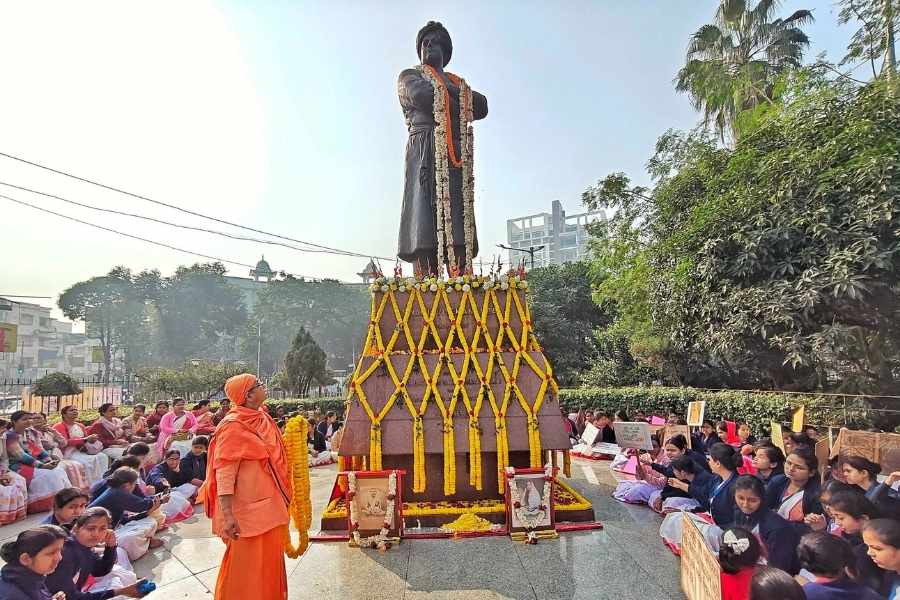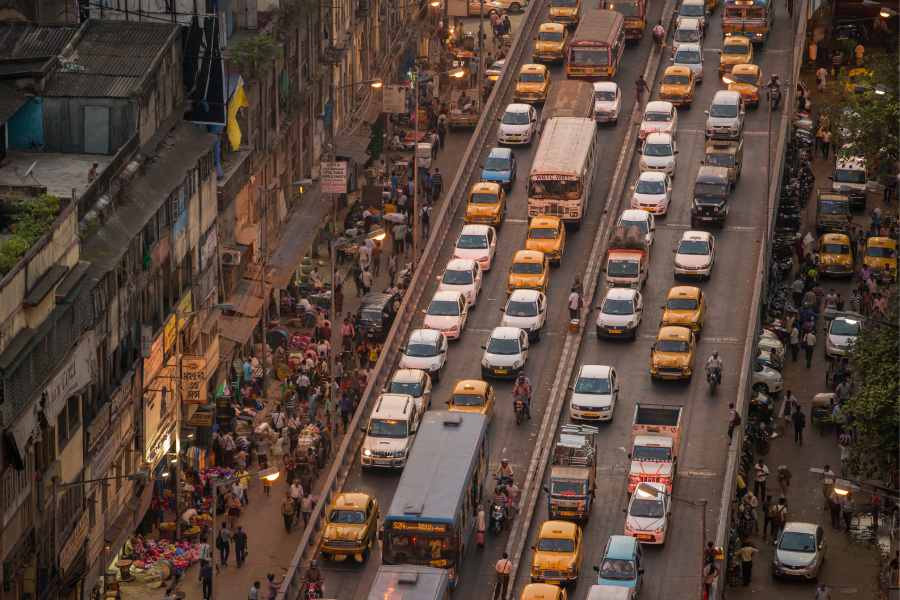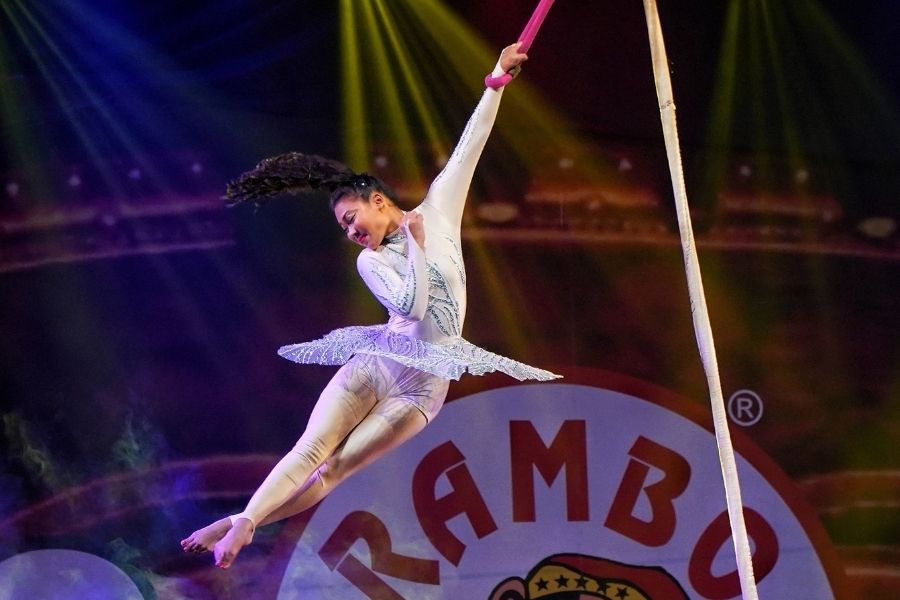 Sunday, 12 January 2025
Sunday, 12 January 2025
 Sunday, 12 January 2025
Sunday, 12 January 2025
Vivekananda on the contradictions within Hinduism
“No religion on earth preaches the dignity of humanity in such a lofty strain as Hinduism, and no religion on earth treads upon the necks of the poor and the low in such a fashion as Hinduism. The Lord has shown me that religion is not in fault, but it is the Pharisees and Sadducees in Hinduism, hypocrites, who invent all sorts of engines of tyranny in the shape of doctrines of Pâramârthika and Vyâvahârika.”
(In a letter to Alasinga Perumal, written on August 20, 1893)
The condition of the poor in India
“And, oh, how my heart ached to think of what we think of the poor, the low, in India. They have no chance, no escape, no way to climb up. The poor, the low, the sinner in India have no friends, no help–they cannot rise, try however they may. They sink lower and lower every day, they feel the blows showered upon them by a cruel society, and they do not know whence the blow comes. They have forgotten that they too are men. And the result is slavery. Thoughtful people within the last few years have seen it, but unfortunately laid it at the door of the Hindu religion, and to them, the only way of bettering is by crushing this grandest religion of the world. Hear me, my friend, I have discovered the secret through the grace of the Lord. Religion is not in fault. On the other hand, your religion teaches you that every being is only your own self multiplied. But it was the want of practical application, the want of sympathy–the want of heart. The Lord once more came to you as Buddha and taught you how to feel, how to sympathise with the poor, the miserable, the sinner, but you heard Him not. Your priest invented the horrible story that the Lord was here for deluding demons with false doctrines! True indeed, but we are the demons, not those that believed. And just as the Jews denied the Lord Jesus and are since that day wandering over the world as homeless beggars, tyrannised over by everybody, so you are the bond-slaves to any nation that thinks it worthwhile to rule over you. Ah, tyrants! you do not know that the obverse is tyranny, and the reverse slavery. The slave and the tyrant are synonymous.”
(In the same letter written to Alasinga Perumal)
Syncretism is the core of Hinduism
“All sectarian religions take for granted that all men are equal. This is not warranted by science. There is more difference between minds than between bodies. One fundamental doctrine of Hinduism is that all men are different, there being unity in variety. Even for a drunkard, there are some Mantras—even for a man going to a prostitute.”
(From a lecture delivered in 1892-93, in then Madras – now Chennai – which were published as Notes Taken Down in Madras, and later included in the volume VI of his complete works).
Why tyranny cannot work:
“So you see, we must travel, we must go to foreign parts. We must see how the engine of society works in other countries, and keep free and open communication with what is going on in the minds of other nations, if we really want to be a nation again. And over and above all, we must cease to tyrannise. To what a ludicrous state are we brought! If a Bhângi comes to anybody as a Bhangi, he would be shunned as the plague; but no sooner does he get a cupful of water poured upon his head with some mutterings of prayers by a Pâdri, and get a coat on his back, no matter how threadbare, and come into the room of the most orthodox Hindu — I don’t see the man who then dare refuse him a chair and a hearty shake of the hands! Irony can go no further. And come and see what they, the Pâdris, are doing here in the Dakshin (south). They are converting the lower classes by lakhs; and in Travancore, the most priestridden country in India — where every bit of land is owned by the Brahmins . . . nearly one-fourth has become Christian! And I cannot blame them; what part have they in David and what in Jesse? When, when, O Lords shall man be brother to man?”
(Vivekananda in a letter written on September 20, 1892, to Pandit Shankarlal of Khetri).
On the consumption of beef, meat and fish
“There was a time in this very India when, without eating beef, no Brahmin could remain a Brahmin; you read in the Vedas how, when a Sannyasin, a king, or a great man came into a house, the best bullock was killed; how in time it was found that as we were an agricultural race, killing the best bulls meant annihilation of the race. Therefore the practice was stopped, and a voice was raised against the killing of cows. Sometimes we find existing then what we now consider the most horrible customs.“
(From the complete works Volume 3)
While having a conversation with his disciples on dietary habits, he said, “What’s the use of your knowing how they came, when you see clearly, do you not, that such notions are working ruin to our country and our society? Just see — the people of East Bengal eat much fish, meat, and turtle, and they are much healthier than those of this part of Bengal. Even the rich men of East Bengal have not yet taken to Loochis or Châpâtis at night, and they do not suffer from acidity and dyspepsia like us. I have heard that in the villages of East Bengal the people have not the slightest idea of what dyspepsia means!”
When a disciple from then East Bengal (now Bangladesh) told Vivekananda he became familiar with dyspepsia only after coming to the western part of Bengal, he replied: “Yes, take as much of that as you can, without fearing criticism. The country has been flooded with dyspeptic Bâbâjis living on vegetables only. That is no sign of Sattva, but of deep Tamas — the shadow of death. Brightness in the face, undaunted enthusiasm in the heart, and tremendous activity — these result from Sattva; whereas idleness, lethargy, inordinate attachment, and sleep are the signs of Tamas.”
Vedanta brain and Islam body — is the only hope for India
“Whether we call it Vedantism or any ism, the truth is that Advaitism is the last word of religion and thought and the only position from which one can look upon all religions and sects with love. I believe it is the religion of the future enlightened humanity. The Hindus may get the credit of arriving at it earlier than other races, they being an older race than either the Hebrew or the Arab; yet practical Advaitism, which looks upon and behaves to all mankind as one’s own soul, was never developed among the Hindus universally.
On the other hand, my experience is that if ever any religion approached to this equality in an appreciable manner, it is Islam and Islam alone.Therefore I am firmly persuaded that without the help of practical Islam, theories of Vedantism, however fine and wonderful they may be, are entirely valueless to the vast mass of mankind. We want to lead mankind to the place where there is neither the Vedas, nor the Bible, nor the Koran; yet this has to be done by harmonising the Vedas, the Bible and the Koran. Mankind ought to be taught that religions are but the varied expressions of THE RELIGION, which is Oneness, so that each may choose that path that suits him best. For our own motherland a junction of the two great systems, Hinduism and Islam — Vedanta brain and Islam body — is the only hope.
(In a letter written to Mohammed Sarfaraz Husain of Nainital on June 10, 1898)
Thoughts on the Mughal Empire, why it succeeded and why it fell
“Look here, how in the modern period the Pathan dynasties were coming and going, but could not get a firm hold of their Indian Empire, because they were all along attacking the Hindu’s religion. And see, how firmly based, how tremendously strong was the Mogul Empire. Why? Because the Moguls left that point untouched. In fact, Hindus were the real prop of the Mogul Empire; do you not know that Jahangir, Shahjahan, and Dara Shikoh were all born of Hindu mothers? Now then observe – as soon as the ill-fated Aurangzeb again touched that point, the vast Mogul Empire vanished in an instant like a dream.”
(From The East and the West, volume V of the complete works).
Democracy and equality cannot be achieved without education
“Men must have education. They speak of democracy, of the equality of all men, these days. But how will a man know he is equal with all? He must have a strong brain, a clear mind free of nonsensical ideas; he must pierce through the mass of superstitions encrusting his mind to the pure truth that is in his inmost Self. Then he will know that all perfections, all powers are already within himself, that these have not to be given him by others. When he realises this, he becomes free that moment, he achieves equality. He also realises that everyone else is equally as perfect as he, and he does not have to exercise any power, physical, mental or moral, over his brother men. He abandons the idea that there was ever any man who was lower than himself. Then he can talk of equality; not until then.”
(Volume VIII of the complete works)
Importance of education for the underprivileged
“The only service to be done for our lower classes is to give the education, to develop their lost individuality…Give them ideas-that is the only help they require, and then the rest must follow as the effect. Ours is to put the chemicals together, the crystallization comes in the law of nature. ….Now if the mountain does not come to Mohammed, Mohammed must go to the mountain. If the poor boy cannot come to education, education must go to him.
(From the volume IV of the complete works)
How does a nation advance?
“A nation is advanced in proportion as education and intelligence spread among the masses. The chief cause of India’s ruin has been the monopolizing of the whole education and intelligence of the land… among a handful of men. If we are to rise again, we shall have to do it… by spreading education among the masses.
(Page 482 of the complete works volume IV)
Work for the underprivileged
“After so much austerity, I have understood this as the real truth-God is present in every jiva; there is no other God besides that. ‘Who serves jiva, serves God indeed’.
(Page 247, volume VII of the complete works)
Football over Gita
“Be strong, my young friends; that is my advice to you. You will be nearer to heaven through football than through the study of the Gita. These are bold words; but I have to say them, for I love you. I know where the shoe pinches. I have gained a little experience. You will understand the Gita better with your biceps, your muscles, a little stronger.
(Page 242, volume III of the complete works)
Conversation with a gau rakshak or cow protector
Vivekananda: What is the object of your society?
Gau rakshak: We protect the mother-cows of our country from the hands of the butcher. Cow-infirmaries have been founded in some places where the diseased, decrepit mother-cows or those bought from the butchers are provided for.
Vivekananda: That is very good indeed. What is the source of your income?
Gau-rakshak: The work of the society is carried on only by gifts kindly made by great men like you.
Vivekananda: What amount of money have you now laid by?
Gau-rakshak: The Marwari traders’ community are the special supporters of this work. They have given a big amount for this good cause.
Vivekananda: A terrible famine has now broken out in Central India. The Indian Government has published a death-roll of nine lakhs of starved people. Has your society done anything to render help in this time of famine?
Gau-rakshak: We do not help during famine or other distresses. This society has been established only for the protection of mother-cows.
Vivekananda: During a famine when lakhs of people, your own brothers and sisters, have fallen into the jaws of death, you have not thought it your duty, though having the means, to help them in that terrible calamity with food!
Gau-rakshak: No. This famine broke out as a result of men’s Karma, their sins. It is a case of “like Karma, like fruit”.
Vivekananda: Those associations which do not feel sympathy for men and, even seeing their own brothers dying from starvation, do not give them a handful of rice to save their lives, while giving away piles of food to save birds and beasts, I have not the least sympathy for, and I do not believe that society derives any good from them. If you make a plea of Karma by saying that men die through their Karma, then it becomes a settled fact that it is useless to try or struggle for anything in this world; and your work for the protection of animals is no exception. With regard to your cause also, it can be said — the mother-cows through their own Karma fall into the hands of the butchers and die, and we need not do anything in the matter.
Gau rakshak: Yes, what you say is true, but the Shastras say that the cow is our mother.
Vivekananda: Yes, that the cow is our mother, I understand: who else could give birth to such accomplished children? I am a Sannyasi, a fakir. Where shall I find money enough to help you? But if ever I get money in my possession, I shall first spend that in the service of man. Man is first to be saved; he must be given food, education, and spirituality. If any money is left after doing all these, then only something would be given to your society.
(Conversations and Dialogues. Complete works Volume VI)
Conversation with Jamsetji Tata
“How wonderful it would be if we could combine the scientific and technological achievements of the West with the asceticism and humanism of India,” Vivekananda told Jamsetji Tata en route to Vancouver from Yokahama on a boat in 1893.
Jamsetji’s voyage to the West was in search of equipment and technology that would build the steel industry and make India a strong industrial nation. In a letter written to Vivekananda on Nov 23, 1898, recalling the conversation, Jamsetji wrote, “I very much recall at this moment your views on the growth of the ascetic spirit in India, and the duty, not of destroying, but of diverting it into useful channels. I recall these ideas in connection with my scheme of Research Institute of Science for India, of which you have doubtless heard or read.”
(Source: VivekVani website).
First step to patriotism is to feel empathy for the underprivileged
“They talk of patriotism. I believe in patriotism, and I also have my own ideal of patriotism. Three things are necessary for great achievements. First, feel from the heart. What is in the intellect or reason? It goes a few steps and there it stops. But through the heart comes inspiration. Love opens the most impossible gates; love is the gate to all the secrets of the universe. Feel, therefore, my would-be reformers, my would-be patriots! Do you feel? Do you feel that millions and millions of the descendants of gods and of sages have become next-door neighbours to brutes? Do you feel that millions are starving today, and millions have been starving for ages? Do you feel that ignorance has come over the land as a dark cloud? Does it make you restless? Does it make you sleepless? Has it gone into your blood, coursing through your veins, becoming consonant with your heartbeats? Has it made you almost mad? Are you seized with that one idea of the misery of ruin, and have you forgotten all about your name, your fame, your wives, your children, your property, even your own bodies? Have you done that? That is the first step to become a patriot, the very first step.”
(In a lecture delivered at Victoria Hall, Madras, published in Lectures from Colombo to Almora)







